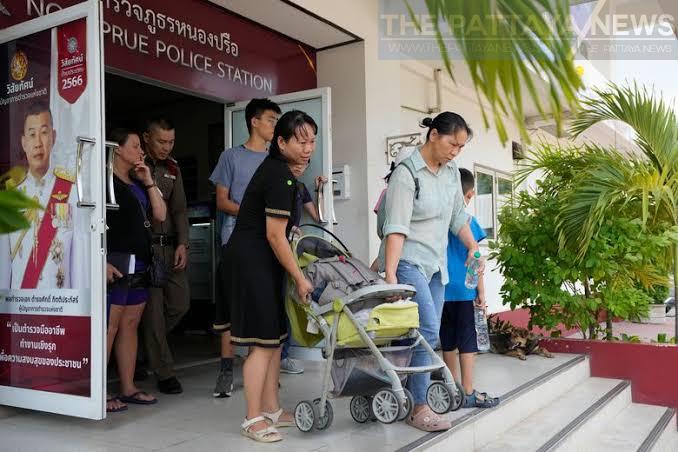Pattaya, Thailand-
A large group of Chinese nationals who fled China due to fears of persecution for their faith were arrested in Pattaya this week for overstaying their visas, a common crackdown in Thailand that normally leads to immediate deportation, but this case has captured major international media attention.
The total of 63 Chinese nationals, which includes 35 children, were arrested Thursday, March 30th, 2023 in the Pattaya area following what Chonburi Immigration said was a tip from a concerned citizen. Activists working on behalf of the detained group claim the informant was working with the Chinese government in an attempt to bring the group back to China, where activist groups claim the large group of Chinese christians could face a variety of harsh penalties.
The group are members of the China Shenzen Holy Reformed Church, more commonly known globally and in the United States as the Mayflower Church. They fled China in 2019 to avoid what they said was imminent persecution, originally going to South Korea, but later fled South Korea to Thailand in 2022 after alleged political pressure from the Chinese government to return them to China increased and Korea refused to grant them asylum. The group claimed there was immense political pressure behind the scenes to deny their asylum requests.
All 63 members of the church are on overstay, according to Col. Tawee Kutthalaeng, chief of the Nong Prue police station. However, Col. Tawee stated that the children have not been charged and for the time being the 28 adults paid a fine on Friday, March 31st, and have been temporarily released under supervision while Thai authorities determine the next steps. Col. Tawee also attempted to calm fears from activists and others that Thailand would deport the group to China, saying that wasn’t the plan.
Thailand does not have an agreement with the 1951 UN refugee convention and attempted refugee cases often make the news in Thailand, with activist groups often trying to pressure Thailand despite not signing the convention to not deport people to their home countries if they could face possible mistreatment, torture, or persecution for their beliefs.
Thailand not being a signatory to the UN treaties does have advantages though, it means that Thailand is not party to the refugee treaties, and so individual groups and agencies—rather than the government alone—can directly process and determine refugee cases on an individual basis. This is also a major reason refugees flee to Thailand as the steps to be able to be sent elsewhere are often less bureaucratic.
Deana Brown, who is an American and is the founder of a Texas-based organization called Freedom Seekers International, has been working directly with the group attempting to get them passage to Tyler, Texas in the United States and to help them start a new life.
Brown told associated media that the group respected Thailand’s laws and had no intention to cause trouble. However, the group were unable to extend their visas due to a current restriction on Chinese nationals that requires them to first have a check with the Chinese embassy before any visa renewal.
This additional step was put in place as an ongoing crackdown in Thailand for several months now as Thai law enforcement combats illegal Chinese grey businesses and crime. According to Brown, however, the extra step makes it impossible for the group to renew their visas because the moment they entered the Chinese embassy they would be detained and deported and subject to possible persecution.
The Chinese embassy has not released any official statements on the situation as of press time.
Nury Turkel, chairman of the United States Commission on International Religious Freedom (USCIRF), released via Tweets on popular social media platform Twitter concerns about the groups safety and fears that if they were deported to China they would face significant punishment.
USCIRF, Freedom Seekers International, and several other groups are currently working on a solution for the 63 Chinese Mayflower members to attempt to get them to the United States while at the same time pleading with Thai authorities not to deport the group to China.
For now, urgent work continues behind the scenes with the Chinese christians while relevant agencies and groups work on the next steps.
The Pattaya News notes that Christianity is not illegal in China and has expanded significantly since the 1980s. Critics, however, claim that it is tightly controlled by the Chinese government and groups must be politically vetted and follow tough rules set by the Chinese government that discourage veering from any official messages or directions. Essentially, the Mayflower group fled this central direction, wanting to be able to practice their freedom of religion and expression without government oversight.
The situation of the stranded Chinese group has driven major international media attention in both America and China with a variety of diverse and passionate opinions on what should happen to the group.





